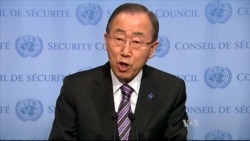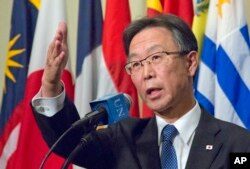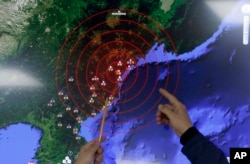The U.N. Security Council on Wednesday strongly condemned North Korea’s apparent nuclear test, saying it will begin work immediately to take “further significant measures” to bring the rogue nation in line with its international obligations.
Council president Ambassador Elbio Rosselli of Uruguay said the latest test clearly violates four existing Security Council resolutions, and is “a clear threat to international peace and security.”
“We think that if no further significant measures are taken by the Security Council, the authority and credibility of the Security Council will be put into question,” Japan’s U.N. Ambassador Motohide Yoshikawa told reporters.
Japan joined the 15-nation council on January 1, filling one of 10 non-permanent seats. Japan, the United States and South Korea jointly requested Wednesday’s closed-door emergency meeting to discuss the development.
Yoshikawa said Tokyo will ask the council for a new resolution that should “be adopted swiftly and whose content should be robust.” He would not elaborate on what kind of sanctions or measures his government envisions.
The Security Council already has a raft of sanctions targeting individuals and entities associated with the country’s nuclear program. There is an arms embargo in place and states are encouraged to inspect and destroy cargo found on their territory headed to or from North Korea that may violate the embargo.
U.S. Ambassador Samantha Power issued a written statement saying, "the international community must impose real consequences for [North Korea's] destabilizing actions, and respond with steadily increasing pressure." She added that the Security Council should impose "a tough, comprehensive and credible package of new sanctions."
UN Chief Responds
U.N. Secretary-General Ban Ki-moon said North Korea’s action was “deeply troubling” and “profoundly destabilizing for regional security.”
“I demand the DPRK cease any further nuclear activities and meet its obligations for verifiable denuclearization,” he told reporters during a brief encounter.
The U.N. chief, who is South Korean, has been reported to be trying to make a visit to North Korea for several months. When asked how Wednesday’s developments could affect a planned trip, his spokesman responded, “You can draw your own conclusions.”
‘Smoking Gun’
The head of the nuclear test ban treaty organization, said the agency registered an “unusual seismic event” in an area of North Korea “very similar” to where a 2013 nuclear test took place.
Executive Director Lassina Zerbo told reporters in a conference call that so far more than 30 of the agency's 337 worldwide monitoring stations have detected seismic activity. He noted that stations do not need to be near North Korea to collect data on seismic activity.
“A station as far as 10,000 kilometers can contribute to the detection of an event,” he said. But he noted that due to weather factors, stations close to the site would be the first to detect the presence of radio isotopes, which are released during a nuclear test.
“Our closest station that would be able to get the smoking gun would be Takasaki in Japan,” Zerbo said about verifying whether a nuclear test took place.
He said they could know in the next few days whether radio isotopes have been released. But he cautioned it is not always so fast, saying that it took about 50 days to confirm North Korea's last nuclear test in 2013.
Zerbo urged North Korea to end its isolation and abide by an international moratorium on nuclear testing.
“North Korea is the only country to have announced or conducted a nuclear test explosion in this 21st century,” he said.







